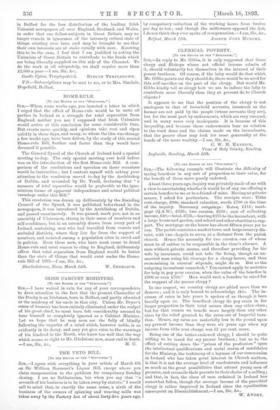[To THE EDITOR OP THE " SPECTATOR.'l SIR,—The following example
will illustrate the difficulty of taxing benefices in any sort of proportion to their value, for the benefit of those more poorly endowed.
About three years ago, inquiry was privately made of me with a view to ascertaining whether it would be of any use offering a. certain benefice to me or to a friend of mine. Having no private. means, I asked for particulars. The receipts were : Tithe rent-charge, 2900, standard valuation, worth 2700 at the time of the inquiry. Necessary outgoings : Rates, £115; mort- gage (Q.A.,B.), £120; two curates, £250; cost of collecting income, 240,—total, 2525,—leaving 2175 to the incumbent, with a large house and garden, and school and other charities to sup- port. The mortgage on the house has about fifteen years yet to run. The parish contains a market town and large country dis- trict, with two chapels to serve, at a distance from the parish church. Hence the necessity for two curates, one of whom must be of calibre to be responsible in the vicar's absence. A man without private means, and therefore providing for his wife by insurance, could not take the living, though an un- married man using his vicarage for a clergy-house, and thus economising in curates' stipends, might do so. But as the outgoing incumbent remarked," You cannot apply to societies for help to pay your curates, when the value of the benefice is 2900 or even 2700." How would such a benefice be rated for the support of the poorer clergy P In one respect, we country clergy are pitied more than we deserve ; and it is only honest to acknowledge this. The in- crease of rates in late years is spoken of as though it bore heavily upon us. The beneficed clergy do pay rates in far larger proportion to their total means than any other class ; but for that reason we benefit more largely than any other class by the relief granted to the rates out of Imperial taxa- tion. Hence, my rates are materially less in the pound upon my present income than they were six years ago when my income from tithe rent charge was 12 per cent. more.
Being one of the better-endowed clergy, I should be quite willing to be taxed for my poorer brethren ; but as to the effect of cutting down the "prizes of the profession" upon the intellectual qualifications and social status of candidates for the Ministry, the testimony of a layman of our communion in Ireland who has taken great interest in Church matters, is that it is not the average level of emoluments and influence so much as the great possibilities that attract young men of promise, and reconcile their parents to their choice of a calling; and that, in fact, the class of men ordained in Ireland has somewhat fallen, though the average income of the parochial clergy is rather improved in Ireland since the equalisation consequent on Disestablishment —I am, Sir, 810., W. AWDRy.,


































 Previous page
Previous page